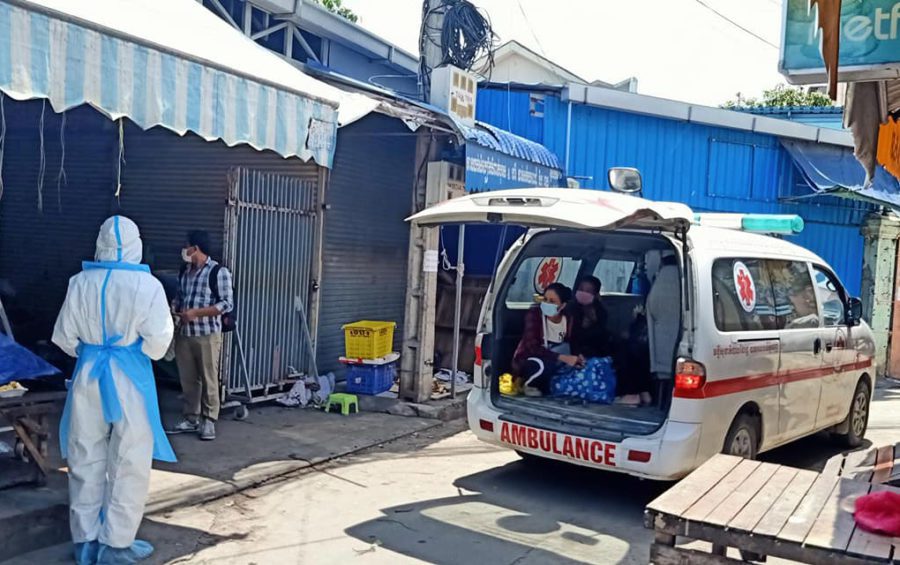Workers drop a rope from their windows to vendors on motorbikes, who take the attached money and tie up pork and vegetables to be drawn to their dormitories, says garment factory worker Kong Neng, who is stuck in a Phnom Penh “red zone.”
Neng is in Choam Chao I commune, in Pur Senchey district, where commune chief Kong Vong says 40,000 workers live in dormitories. The district has seen 685 Covid-19 cases in just the past week, the worst-hit area in the city and country. Many of the cases have been linked to garment factories.
Neng, the factory worker, says ambulances have pulled up to his building over the past two weeks to carry away workers found to be infected with Covid-19. Each time, he is filled with concern, he says. He and others in the building have also been tested but have been cleared so far, he says.
Neng is mostly living off instant noodles, rice and sauce handed out by the state, though they also have some dried fish, and some means of getting a little more despite being locked in the building — vendors on motorbikes sometimes pull up to the dormitory’s windows, he says.
Despite the risks, however, amid the boredom the workers walk from room to room to chat, he adds.
Ngoun Kong, another garment factory worker living nearby, says she has eaten only eggs and canned fish since the lockdown started, and had yet to receive free supplies from the state.
“Do they want to leave me to die?” she says.
Vong, the commune chief, says roughly 10 percent of the area’s workers are testing positive for Covid-19 as health officers collect samples at two local testing centers.
The commune receives 1,000 to 1,500 packets of supplies to distribute each day, but there are 40,000 workers living in dormitories, he notes.
“As you know, what we have is limited,” he says.
Though the government initially said the Commerce Ministry would take over all food distribution and sales in the red zones as it shut down all markets, Vong says local authorities are now setting up market spaces on Veng Sreng Boulevard and a nearby gated community.
“Mobile vendors and trailers, they can sell there, but they have to set up tents … and sell only in the morning until 10 or 11 a.m.,” he says.
However, Vong says that until the authorities set up the designated spaces, the vendors have been ”selling all over the place.”
In a statement, the World Health Organization on Sunday urged individuals and authorities to keep up their vigilance amid the country’s ongoing Covid-19 outbreak.
“[H]ope is not lost, as long as Cambodia acts as one,” said Li Ailan, the WHO’s Cambodia representative, noting that current outbreaks were centered around garment factories and markets.
Government spokesperson Phay Siphan acknowledged some difficulties in supplying food.
“We apologize to the people. When we have a problem, we solve it gradually. There will not be a shortage of food, but it could be a little late,” Siphan said.
In Choam Chao I, Pov Vuthy says his building has about 100 rooms, and everyone is locked in except for a couple hours in the morning. The building next door, with about 80 rooms, follows the same routine, he says.
“At about 5 or 6 until about 7 we have the freedom to walk out of the accommodations to buy food, and then we rush to come back to our rooms,” he says. He notes that there are still some mobile vendors despite red zone regulations forbidding them.
Chan Sina, another factory worker in the district, says people are feeling under pressure.
“There are shortages of everything — like rice, food and no money for other expenses,” she says.
The situation is similar in other factory areas. Thorn Meng, a worker in Sek Sok district’s Kok Khleang commune, says she lives in a building with about 50 workers with her three children, aged 3, 2 and 8 months.
“Right now, I only stay inside my room. I don’t dare to go out. It feels very different and difficult for me. For my little children, I just try to let them survive. I don’t have any solution. Every day, I feed them porridge and soy sauce. I’ve sent a message to the authorities asking for food support for five days now, but I don’t see anyone coming to help us,” Meng says.
“The factory did not help me and the landlords also did not help me,” she says. “I have no income right now … so it’s quite difficult for me.”













